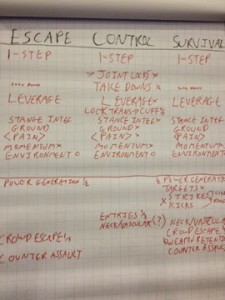- 1-step
- Joint locks
- Take downs
- Leverage and leverage points
- Stance integrity
- Ground movement
- Pain (ethics and application)
- Lock transition to cuffing
- Momentum
- Using the Environment
Tuesday I found out some of the students weren’t allowed to arrest, so they didn’t need cuffing. Most carried weapons (“waffen”) –pepperspray and batons– but not firearms. I had 10-15 agencies with different policies and equipment.
Turns out I’m relatively good at this. Yeah, international trainer and all that jazz, blah, blah, blah… but I have never felt like I’m a good teacher, which probably has a lot to do with the tendency to improve…
Fighting organizes. It can organize in several ways. So I made the most appropriate organization for this group and let them vote on what they needed. We can talk about why later. The thing that I got excited about is that, as much as I train and think about conflict, I’d never organized it this way. Three levels: Escape, Control, Disable/Survival.
Completely different in every aspect. Only the Principles (things that made everything else work) crossed all three categories. And some became awesome insight. Power generation (one of my building blocks) is entirely different in “escape mode” and “damage mode” and doesn’t apply (as I define it) at all in control mode. So I put the building blocks under the categories in which they were important. And let the students vote.
Okay, that’s good teaching, let the adult students take control, blah blah blah…
But I don’t think i have ever once looked at my personal lost of critical skills (the BUILDING BLOCKS) and tied the to the basic goals–escape, control, disable. And it was easy. And powerful. And empowered the students.
Escape, Control, Disable/Survival. It’s a way to organize everything you teach, a way to decide what is relevant and what isn’t. Strategies, mindset and appropriate techniques are very different for these three different fie
